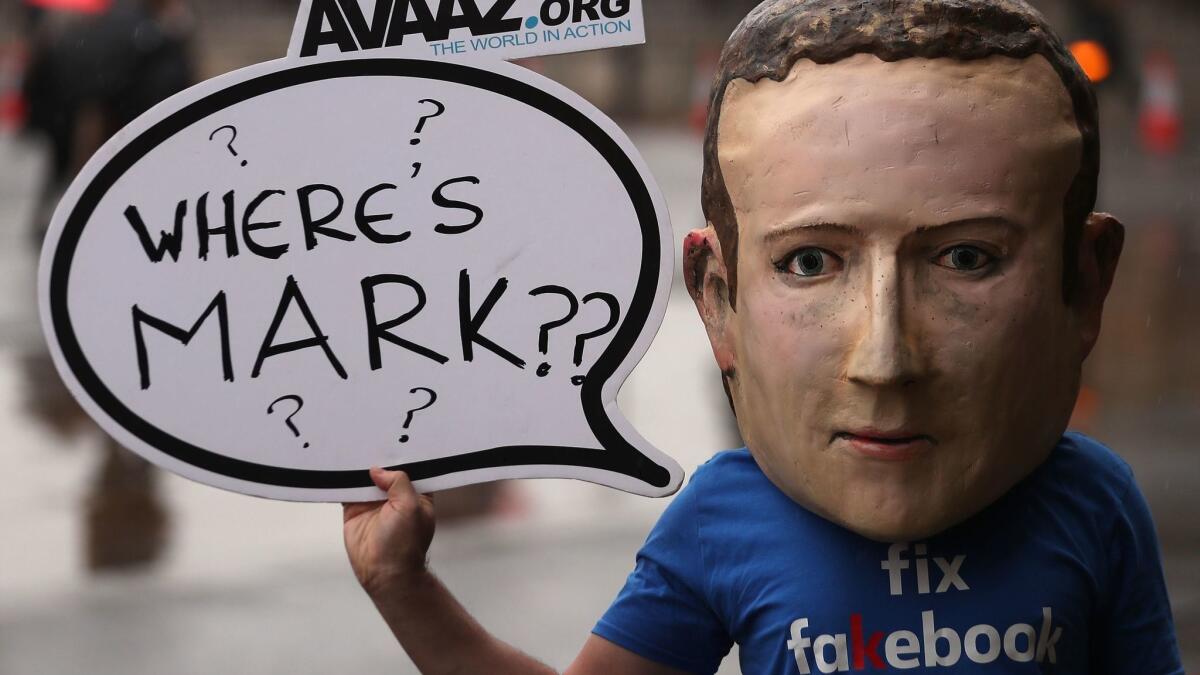9 nations slam Facebook for its failures to protect data and stop fake news. Zuckerberg doesn’t attend

Facebook Inc. faced a fresh lashing Tuesday from regulators representing Canada, France, Britain and six other countries upset about the social-networking giant’s inability to stop the spread of misinformation online and protect its users’ personal data.
The series of rebukes — delivered in London at a rare joint hearing featuring policymakers from around the world — reflected the vast magnitude of growing global unease with Facebook’s business practices and mounting frustration with the company’s chief executive, Mark Zuckerberg, who declined to appear in front of lawmakers and address those criticisms directly.
“While we were playing on our phones and apps, our democratic institutions, our form of civil conversation, seem to have been upended by frat-boy billionaires from California,” said Charlie Angus, the vice chair of a top privacy committee in Canada, who criticized Zuckerberg for his decision to “blow off” the hearing.
“I put it to you that you have lost the trust of the international community to self-police,” Angus continued, “and we have to start looking at a method for holding [Facebook] accountable.”
Damian Collins, a member of Britain’s House of Commons who convened and chaired the hearing, lamented a “consistent pattern of Facebook failing to disclose” key information to regulators. He pointed to newly obtained evidence, including an unreleased document that may show Facebook data was vulnerable to Russian actors in 2014, as he asked the company: “Can you not see this has caused a massive breach of trust?”
Appearing in Zuckerberg’s place was Richard Allan, Facebook’s vice president of policy solutions. Immediately under siege from the legislators, Allan at one point acknowledged that Facebook had “damaged public trust by some of the actions we’ve taken.” Asked how Zuckerberg’s absence might appear, though, Allan later said it was “not great.”
Joining Britain were legislators from Argentina, Belgium, Brazil, Canada, France, Ireland, Latvia and Singapore. All together, the countries represent more than 446 million people — and have grappled firsthand with the real-world consequences of social media’s digital ills. Some, including Brazil, have confronted the rapid proliferation of falsehoods around national elections on both Facebook’s namesake social network and its messaging service WhatsApp.
Others belong to the European Union, which has threatened even further, tougher regulation of the way Silicon Valley tech giants collect private data and police their platforms for abuse.
“We recognize we are doing something new,” Allan said in response Tuesday. “There were things we missed, that we were either not sufficiently focused on or too slow to react to.”
Representatives of the nine countries later signed a set of international “Principles of the Law Governing the Internet,” signaling even greater scrutiny of Facebook and other social media companies still to come.
In the United States, meanwhile, senators held a hearing of their own — grilling members of the Federal Trade Commission, the agency that’s investigating Facebook for its privacy mishaps.
Facebook stock fell 1% on Tuesday to $135 a share.
For months, Zuckerberg has resisted testifying in Britain as members of Parliament investigate the spread of misinformation and the role played by political consultancy Cambridge Analytica around Britain’s vote to withdraw from the European Union. The firm had improperly accessed data on millions of Facebook users, prompting Britain’s regulators to fine Facebook this year for the security lapse, though the company has said it intends to appeal.
But concerns about political manipulation on social media — particularly during national elections — have gone global. In October, countries including Argentina, Brazil, Canada and Singapore began to add their voices to Britain’s calls for Zuckerberg to testify. Repeatedly, though, Facebook said its top executive was unable to appear, opting this month to send Allan, a former member of Britain’s Parliament, in his place.
Those lawmakers came to the hearing Tuesday — the first such joint session hosted by the House of Commons since 1933 — incensed and armed with a litany of complaints. Many countries expressed fear that Facebook remains ill-equipped to fight foreign actors, including Russian agents, that seek to manipulate elections. British policymakers took issue with reports about Facebook’s political activities to fight back against regulators in the United States. And one lawmaker from Canada suggested taking apart the social network and the services it owns, including WhatsApp and the photo-sharing service Instagram.
“Perhaps the best regulation is antitrust,” Angus said. “Perhaps the simplest form of regulation would be to break Facebook up or treat it as a utility.”
For representatives from Singapore, meanwhile, the chief source of frustration was Facebook’s inconsistent approach to hate speech and its ability to trigger real-world violence. One member of the country’s parliament, Edwin Tong, referenced a post that went viral in Sri Lanka that called for killing Muslims.
“If it’s not down, it should be,” Allan told Tong before the lawmaker revealed a communication from Facebook saying the post in question did not actually violate the company’s policies.
Adding to Facebook’s woes was a trove of documents obtained by British lawmakers last week that, if released, could call its privacy protections into further question.
The materials came from Six4Three, an app company that has sued Facebook in California over policy changes in 2015 that limited its ability to access data it needed to function. In the United States, a judge has shielded those documents from public view by placing them under seal. But Britain’s legislators led by Collins obtained them after the founder of Six4Three traveled to London last week.
On Tuesday, Collins pointed to a communication from the newly acquired trove that appeared to show a Facebook employee in 2014 had found suspicious activity with potential Russian ties trying to capture large swaths of data on the site. In response, Allan said at the hearing that the documents generally are “potentially misleading.”
A spokesperson for Collins declined to elaborate on the document, and Facebook said in a later statement that it “found no evidence of specific Russian activity.”
Romm writes for the Washington Post.






